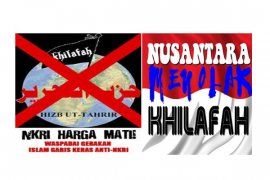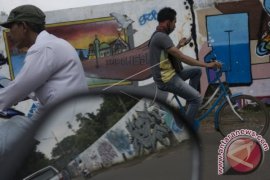President Duterte claimed that the extremist Islamic State group would creep into Southeast Asia to establish a four-nation caliphate in the region. The president said the violent Islamic armed group might retreat to Southeast Asia if they were flushed out of Iraq and Syria, a distance of more than 8,000 kilometers. Duterte said the ISIS, these extremists, are fighting it out in Aleppo and Mosul. Once they run out of land base, they would retreat to the sea and escape. Its to be our problem now, because they have this dream of a caliphate kingdom that would be comprised of Indonesia, the Philippines, Malaysia and Brunei.
Duterte did not offer evidence for his claims, and he is known to have made outrageous statements in the past, but he raised the IS threat on the day The Jakarta Post reported the warning issued by the Indonesian Military (TNI) that the Islamic State (IS) group has been working to create a fully pledged wilayat (province) in the southern Philippines that would pose a serious security threat to Indonesia.
The report quoted TNI Commander General Gatot Nurmantyo as saying last Tuesday that the IS has been losing ground in Iraq and Syria to internationally backed anti-IS forces and has started building its base in Mindanao, which shares its borders with Kalimantan and Sulawesi.
The president reiterated the importance of having a federal government in securing peace in Mindanao. "Believe me. It's up to you. I leave it to the people to decide. If the federal system would not be approved, you might as well give up Mindanao. We will not have peace," he said.
"Hence, if others are resistant to the idea of a federal setup, without that federalism, the Moro people will never agree to anything else," he added. The president also urged the public to be prepared for possible terror attacks in the country. "The next adventure that I will embark on is terrorism. Be prepared for that. That’s what I fear most, including this problem on illegal drugs," he said.
Meanwhile, the United States is helping Southeast Asian allies do more to prevent the Islamic State group from gaining a greater foothold in the area. The IS has already established a presence in several countries across the region including Malaysia, Indonesia, Singapore and the Philippines, and authorities worry both about domestic attacks and nationals traveling to join the jihadists in Iraq and Syria.
According to General Joe Dunford, chairman of the Joint Chiefs of Staff, told the Senate Armed Services Committee that the United States is helping partners share intelligence and information on extremist groups.
In Indonesia, the world's most populous Muslim-majority country, there has been a surge in attacks and attempted attacks this year due to the growing influence of IS. According to Dunford, more than 1,000 Indonesians have left to join IS in Iraq and Syria, and hundreds from the Philippines.
"The group, the Abu Sayyaf, is a loose network of a militants that has in recent years pledged allegiance to IS. Abu Sayyaf is mainly focused on a lucrative kidnapping business rather than religious ideology," Dunford further asserted.
Meanwhile, Defense Secretary Ashton Carter said he was meeting with regional defense ministers next week at a summit in Hawaii and IS would be one subject of discussion. "Southeast Asia clearly is a place (IS aspires) to spreading," Carter said.
Earlier, the United States has worried about Islamic State of Iraq and Syria network has been spreading in South East Asia countries. Islamic States has been trying to local militant group who had been existed in South East Asia.
All this time, Islamic States has "partnership historically" been with a number of militant group in the world such as in Egypt, Libya and Nigeria. A Terrorisme Crushing Coordinator at the United States Foreign Ministry, Justin Siberell has explained that Islamic States has been wanted to spread their influences in South East Asia contries.
Siberell has asserted that militant in South East Asia who has been fighting for Islamic States in Iraqi dan Syria had been deployed in the special unit which is called 'Katibah Nusantara'. Their existences, Siberell further explained, it could be given a huge threat if they will be came back to their each countries.
So far, a number of small attacks and a terror attacks plan which is involved Islamic States network has been thwarted in South East Asia region. The terror experties has worried about Islamic State network will be efectively to grow in these region.
Based on the reports of Foreign Affairs Global Terrorist Fighter, Indonesia is among countries that became members of ISIS supplier who until January 2016, there were 300 people. Meanwhile, the country most of its citizens who joined the ISIS include Tunisia (6,000), Saudi Arabia (2,275 people’s), Jordan (2,000 people’s), Russia (1,700 people’s), France (1,550 people’s), Turkey (1,400), and Morocco (1,200). Based on the data owned by the Indonesian government on the sharing of resources, there were 500 people.
Risk Assessment in the Regional Meeting on Terrorism Financing 2016 South East Asia and Australia in Bali, Indonesia has mentioned in the category of very threatened. Currently, there were 568 people in Indonesia who went to Syria and Iraq to join ISIS. As many as 183 of them have returned. This figure is higher than in Malaysia with 73 and Australia 110 people who have traveled to Syria and Iraq. In addition, it was detected 11 terror groups active in Indonesia.
The movement of Islamic State of Iraq and Syria (ISIS) is quite intense recently. It also develops in some regions in Asia such as in the Philippines and Indonesia. The development of ISIS in both countries is supported by the existing Islamic radical groups in respective countries, the Bangsamoro Islamic Freedom Fighters (BIFF) and Abu Sayyaf group in the Philippines and Jemaah Anshorut Tauhid led by Abu Bakar Baasyir, Mujahidin of Western Indonesia and Mujahidin of Eastern Indonesia led by Santoso, and Forum Aktivis Syariat Islam (Faksi) in Indonesia.
In general, those groups give their supports to the caliphate established by Abu Bakr al-Baghdadi. BIFF, for instance, showed its support to ISIS in social media by releasing a video on YouTube. In the video, BIFF's leader was surrounded by some armed men reading its official statement to support ISIS. Another way is by gathering people or volunteers, done by Nasir, to be sent to Syria. The same things are done by the radical group in Poso.
In the development, ISIS' supporters in Indonesia are not centralized in one area but spreading in Jakarta, Bandung, Malang, Solo, and other locations. ISIS even might have reached Aceh, indicated by the unification of Fachrudin alias Din Robot Group. This shows that ISIS’ influence in Indonesia is getting wider especially considering that this group can effectively utilize social media to spread its influence.
Handling Terrorism Issue
Now, terrorism attacks is a specter for all of countries in the world specially for the United States and their allies, because a terror groups have a huge capacity to attacking the interest of United States through their "lone wolf" who was sworn to loyal to IS. A number of lone wolf which was happened in South Dakota, Colorado, Washington, New York, Burlington, Nice, Montplier in France and a number cities in Germany, Belgium, Turkey etc had been shown that the deadly attack of a terror groups were haunting the United States and their allies.
Naturally, if then the United States and their allies are seeking a deep relationship with a number of Southeast Asia countries which has been decided as recruitment base of Islamic States.
The United States and their allies are trying to work with them to develop a framework within which they can share information and share intelligence. They are absolutely working close with our partners, and frankly, the limit of the support we provide is often what they are willing to accept politically.
Cooperation to combat the threat of terrorism is a solution and the best strategy, but these activities should be done in mutual respect and not become an excuse for the United States to accuse as the hive of terrorists so legitimately taken "pre-emptive strikes" to countries that reject it.
*) The writer earned his master degree at the University of Indonesia (UI). Previously, he was earned his bachelor degree on political sciences at the University of Jember (Unej).
The Threats of Islamic State
Selasa, 20 Desember 2016 7:04 WIB

Toni Ervianto. (ANTARA FOTO/IstiDokumentasi Priobadi/Dok).
Cooperation to combat the threat of terrorism is a solution and the best strategy.








